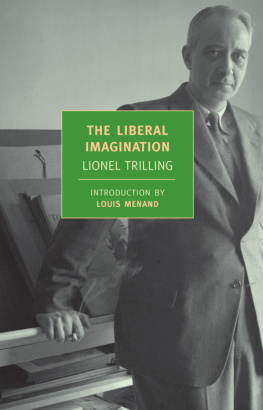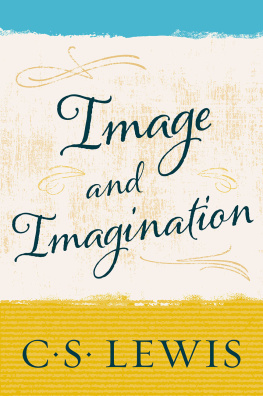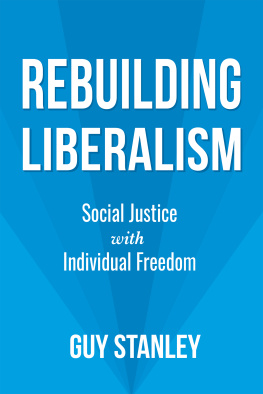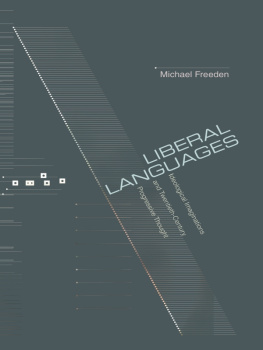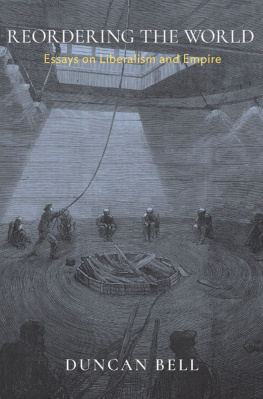LIONEL TRILLING (19051975) was born in New York and educated at Columbia University, to which he returned as an instructor in 1932, and where he continued to teach in the English Department throughout his long and highly distinguished career as a literary critic. Among the most influential of his many works are three collections of essays, The Liberal Imagination, The Opposing Self, and Beyond Culture; a collection of lectures, Sincerity and Authenticity; a critical study of E. M. Forster; and one novel, The Middle of the Journey (available as an NYRB Classic). The Journey Abandoned, an unfinished novel, was published posthumously in 2008. Lionel Trilling was married to the writer and critic Diana Trilling.
LOUIS MENAND is the Anne T. and Robert M. Bass Professor of English at Harvard University, and a staff writer at The New Yorker. He is the author of Discovering Modernism, The Metaphysical Club and American Studies.
THE LIBERAL IMAGINATION
Essays on Literature and Society
LIONEL TRILLING
Introduction by
LOUIS MENAND
NEW YORK REVIEW BOOKS

New York
Contents
Introduction
The Liberal Imagination made literary criticism matter to people who were not literary critics. Lionel Trilling was forty-five when his book came out, in 1950, and he was hardly unknown. His doctoral dissertation, on Matthew Arnold, was published in 1939 and reviewed with admiration by Edmund Wilson. His study of E.M. Forster, in 1943, was the occasion for a piece in Time. A novel, The Middle of the Journey, published in 1947, had a less happy reception and disappointing sales, but it was widely noticed. Trilling was a professor at Columbia and a contributor to The New Yorker and The New York Times. Still, The Liberal Imagination was a phenomenon. It sold seventy thousand copies in hardcover and one hundred thousand in paperback. And it changed the role of literature in American intellectual life.
The first thing to say about The Liberal Imagination is that it is a cold war book, though that is by no means the last thing to say about it. It appeared around the same time as Arthur Schlesinger Jr.s The Vital Center, Richard Crossmans The God That Failed, and George Orwells 1984books that belong to the case for a liberal anticommunism. Trilling was certainly a liberal anticommunist. Orwell was one of his heroes: Trilling reviewed 1984 in The New Yorker (where he called the book momentous), and wrote an introduction to the 1952 reprint of Orwells expos of Stalinist hypocrisy and brutality, Homage to Catalonia (where he called Orwell a figure in our lives). He and his wife, Diana, were members of the American Committee for Cultural Freedom, founded in 1951; and he was prominently associated with Partisan Review, which had been, since 1937, the journalistic home of the anticommunist left. Anyone likely to pick up The Liberal Imagination in 1950 would have understood it as warning against the dogmatism and philistinism of the fellow-traveling mentality, and, later in his life, Trilling explicitly acknowledged that he had intended the collection to be an attack on Stalinism.
But its significant that the term liberal is never defined in The Liberal Imagination. There are, as a matter of political theory, radically different types of liberals. There is, in Isaiah Berlins famous distinction, the liberal who believes in negative liberty, freedom from, and the liberal who believes in positive liberty, freedom for. There is the liberalism of markets and individualism, and there is the liberalism of planning and the collective. Someone who thinks that hate speech should be banned is usually called a liberal, but someone who thinks that freedom of speech should be absolute is usually a liberal, too. In Trillings time, the division between liberal anticommunists and liberal anti-anticommunists, minor as it might appear from a historical distance (most anti-anticommunists were not pro-communist), seemed unbridgeable. Some liberals argued that membership in the Communist Party disqualified a person from teaching or from joining a labor union, and some disagreed. So when, in the introduction to The Liberal Imagination, Trilling says, in the United States at this time liberalism is not only the dominant but even the sole intellectual tradition, he is indicating, in an elliptical fashion that was characteristic of his style, that he is treating all liberals alike.
For a key perception of the book is that most human beings are not ideologues; intellectual coherence is not a notable feature of their politics. Peoples political views may be rigid but they are not necessarily rigorous. They tend to derive from, or to be reflections of, some mixture of sentiment, custom, and moral aspiration. Trillings point is that this does not make those views any less potent in the political world; on the contrary, its the unexamined attitudes and assumptionsthe things that people take to be merely matters of manners or taste, and nothing so consequential as political positionsthat require and repay critical analysis. Unless we insist that politics is imagination and mind, as he puts it in the essay on Partisan Review, we will learn that imagination and mind are politics, and of a kind we will not like.
In Trillings view, the assumption all liberals share, whether they are Soviet apologists, Hayekian free marketers, or subscribers to Partisan Review, is that people are perfectible. A liberal is someone who believes that the right economic system, the right political reforms, the right curriculum, the right psychotherapy, and the right moral posture will do away with unfairness, snobbery, resentment, prejudice, tragic conflict, and neurosis. A liberal is a person who thinks that there is a straight road to health and happiness. The claim of The Liberal Imagination is that literature teaches that life is not so simplefor unfairness, snobbery, resentment, prejudice, tragic conflict, and neurosis are literatures particular subject matter. This is why literary criticism has something to say about politics. Not every work of literature conduces to an awareness of the kind of complication that Trilling wants liberalism to confront, of course. The Liberal Imagination is a descendant of Culture and Anarchy (1867), another book intended to chasten the liberalism of its day, and Trilling uses literature in the same way that Arnold used culture and poetry: as a general term that actually refers to a select canon. Patrolling the boundaries of that canon turns out to be one of the critics chief duties. A generation of critics, many of them inspired by Trillings example, rose to the task.
Two lessons can be drawn from the way literature is treated in The Liberal Imagination, and they point in very different directions. The first lesson, and the most influential, is that there are more and less politically hygienic works of literature, and the function of criticism is to identify them and to explain why they tend to good or bad political consequencesa job that requires special skill, since a books politics may be quite different from its political consequences. Dreiser and James: with that juxtaposition we are immediately at the dark and bloody crossroads where literature and politics meets. One does not go there gladly, but nowadays it is not exactly a matter of free choice whether one does or does not go.... The liberal judgment of Dreiser and James goes back of politics, goes back to the cultural assumptions that makes politics. The business about the dark and bloody crossroads, with its reminiscences of Arnolds ignorant armies and Oedipuss parricidal moment, is pretty dramatic: it makes it seem as though a lot is at stake in getting books right. It assigns literary criticism a mission. Although not much actual blood was spilled over James or Frost or T. S. Eliot in the literary wars of the 1950s and '60s, the spirit of battle animated criticism.

